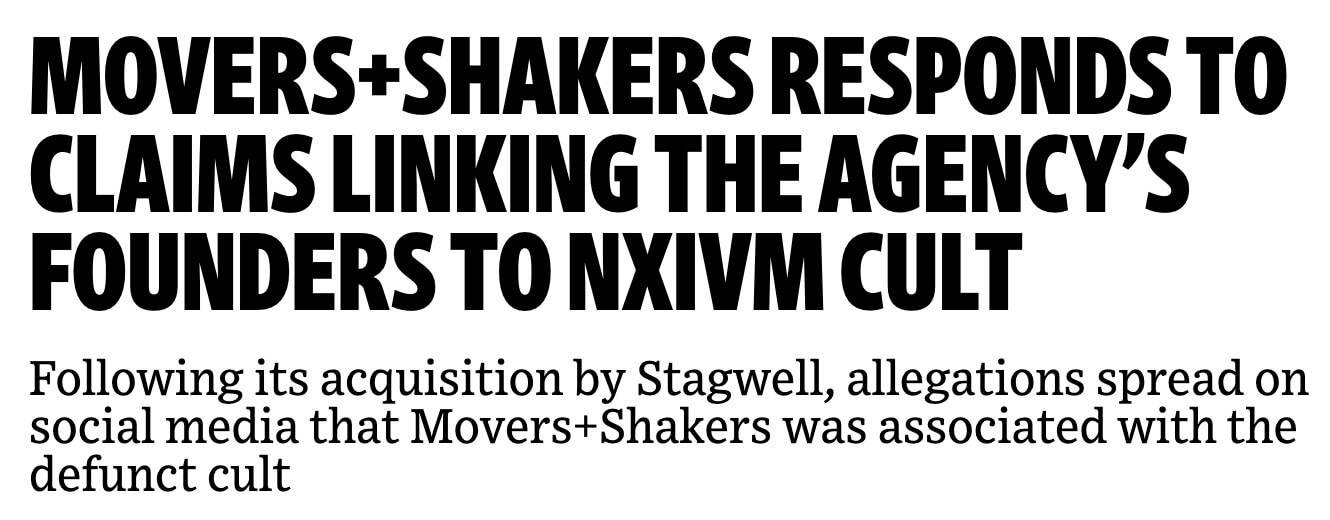What to do if your marketing agency is accused of being a cult
Or rather, participating in a cult. The agency isn't a cult.
Hello Gobbledeers,
How’s it going? This week we’re going to talk about:
1) Nobody caring what your company is saying.
2) Splunkers
3) What happens when your founders may (may!) have been in a cult. Or cult-adjacent.
No One Gives a Sh*t About What You Have to Say
If I could boil down the 85 (!?) columns I’ve written into one idea, it would be that we should watch that Miss Teen South Carolina clip from the last issue once a week.
But if I could boil it down into two things, it would be the thing about watching that clip and then also that the gap between good marketing and gobbledy would be smaller if there were more trust within companies - if the marketing team trusted that the sales team knew how to sell; if the sales team trusted that the marketing team really was trying to get them good leads; if the CEO trusted that the marketing team was trying to build a brand that would generate long-term value; if if if.
I’ve written about the great campaigns that have been created because an organization had trust, most recently about Oatly’s amazing positioning and copywriting. The only way you can write an ad that says “This Tastes Like Sh*t, Blah!” is if the CEO trusts that the marketing team understands what’s right for the brand.
Given that, I thought it was worth sharing this article written by the recently-fired Oatly creative director about 5 lessons he learned working at a company that was run based on trust. This was particularly striking, because I’ve never worked anywhere like it:
There was no C-suite swoop–ins at Oatly; no complicated approval processes, no testing, and risk was something that was welcomed, not avoided. All the internal machinations that dull the edges of marketing did not exist. And that’s largely because of trust.
The trust we enjoyed was partially born out of the long–time relationship between Tony Petersson, the CEO who led Oatly’s rebirth in 2013, and John Schoolcraft, the creative leader he brought with him. It was also partially born out of the fact that Tony is one of those rare CEOs who trusts in the power of creativity; and who believes creativity doesn’t belong in a department – it needs to be infused throughout a company.
Since you’re not going to read that article (probably!), here’s my key takeaway:
Remember, no one cares. One of the most enabling aspects of working on Oatly was the freedom to openly admit that no one gives a shit about what we had to say.
No one gives a shit about what you have to say, either. That should feel liberating.
Just One Word…
It may seem like we talk quite a bit here about the ridiculous letters that CEOs write when they do a layoff, but that’s only because we talk quite a bit here about the ridiculous letters that CEOs write when they do a layoff (alas, poor Knockstars, we hardly knew ye…).
If you spoke with a CEO who had to write one of these, I’m 1000% certain they would tell you that writing a note that captured their sadness and disappointment would be challenging. And sure, sometimes these notes come across as ridiculous, but I guess I can recognize that writing a “we did everything we could, but today we have to say goodbye to many of our incredibly valuable Splunkers” letter would be difficult.
But I’d also guess that when you write one of these, you kinda assume you’re only going to write ONE of these. Not, y’know, TWO of these letters. Like you assume you’re going to do a layoff, write a letter to the Splunkers (or whatever), and then not have to lay off more Splunkers (or whatever) and send yet another letter.
Except of course, sometimes the first layoff isn’t the last layoff. Sometimes you have to do a second round of layoffs. Whew, that sucks. In that case, as a CEO you have three choices:
Write a new letter where you say, “we mean it, this is the last time we have to say goodbye to some Splunkers, our product is ahead of the market, nobody appreciates how amazing our product is, etc etc etc…”
You ask someone else to write that letter, because you already said what you had to say, and maybe someone on your team can come up with a better pile of words.
You just say, “Eh, screw it, they’re going to hate me no matter what I do, so maybe I’ll just literally send the same email out, but I’ll change a word here or there.”
If you’re the CEO of Splunk (huh, that’s an actual company name, who knew?), and you’re faced with the second set of layoffs in a year, you send out an email that’s basically the same email as you sent the first time around (I mean, those people were laid off successfully, so why mess with a good thing?), but you tweak the subject line:
Though the layoff may feel like déjà vu for Splunk employees, Steele made sure to switch up his condolences. He titled February’s layoff letter, “Evolving for Splunk’s Future” and expressed his “gratitude” for the contributions the laid-off workers had made to the firm and its customers. This time, it was “Transforming for Splunk’s Future” and he expressed his “deep appreciation.”
Poor Splunkers.
The Cult of Marketing
Here’s an AdAge headline you don’t want to see if you run a marketing agency:
I mean, I could definitely walk you through the details of this, but where’s the fun in that?
It’s right here! Of course I’m going to walk you through this. You are freakin’ welcome!
I’ll keep it short. Ish. Short-ish.
(If you don’t know what NXIVM is, I’m kinda jealous. Also, it was a cult…er, “defunct cult.” People went to prison because of it. Also also, they offered “human development” courses. Also also also, there are roughly 3,000 hours of podcasts and Netflix shows about this story that you can go enjoy).
Here we go…
Spruce Point Capital Management are short sellers who are trying to (hm…what’s the opposite of a pump and dump scheme? A dump and pump?) drive down the price of e.l.f. beauty stock. To accomplish this, they put out a press release in which they say they say that e.l.f. is “one of the most richly valued stocks in the cosmetics and beauty industry…”
That’s great! Congrats, e.l.f.!
Yet, it continues:
“However, we were shocked to learn that e.l.f. achieved this growth by establishing a close business relationship with Movers+Shakers…”
Uh oh.
“…whose founders were previously members of the NXIVM cult. Although the founders were not charged with any wrongdoing, we find concerning evidence to suggest that Movers+Shakers and/or its founders may [italics mine] have continued sympathy and/or affiliation with the teachings of NXIVM.”
It’s here that I’ll note that word “may” is doing quite a bit of work there. If I, for example, suggested that the founder of a company I used to work for “may have continued sympathy for Al Qaeda,” you’d probably think that my former boss DOES have sympathy for Al Qaeda. I assure you, the person I’m thinking of may not have continued sympathy for Al Qaeda.
The founders of the agency are being accused of being cult-sympathizers because some time ago they took part in a “human development” course called Executive Success Program (ESP). Which maybe is an innocuous professional development program and maybe was also a kind of multi-level-marketing scheme and sorta NXIVM cult-adjacent, in the way that the Sunshine Carpet Cleaners on Seinfeld was a cult-adjacent carpet cleaning company.

So if you’re the founders of this agency, I assume you’d like to pretend you were not accused of being cult members and just shut the hell up and hope this goes away.
However, the agency was recently acquired by a publicly traded company so 37,000 phone calls with lawyers later, they have to put out a press release explaining the situation. And I don’t have to tell you that you are most definitely not winning the messaging battle if you have to put out a press release saying that you are NOT a cult member, but you DID do professional development courses run by a cult:
We are big believers in personal development, and we have done many seminars and coaching programs over the years. In the 2010s, we participated in a professional leadership training course called the Executive Success Program (ESP). This course was affiliated with a parent company called NXIVM.
They love personal development! And they’ve done a bunch of personal development stuff. And only one of those stuffs was “affiliated” with a cult. Just one!
Key takeaways:
Movers + Shakers are accused of being single-handedly responsible for the amazing growth of e.l.f. beauty. Congrats!
A short-seller trying to drive down the price of e.l.f beauty stock also accuses the founders of its social media agency (?) of being part of a cult.
Therefore the stock is overvalued. Or something.
I think that once you’re forced to respond to claims that your founders are part of a cult, you’re kinda screwed.
Accusing people of being in a cult is a pretty effective short selling tactic.
As always, thanks for reading to the bottom. I’m always happy to chat about your marketing concerns - here’s my Calendly link. It’s free. I promise. The people I’ve met with usually just want to chat about their messaging and see what I think. That’s a good use of that time.
Or you can just shoot me an email by hitting reply…





Congrats on finally writing the column some say you were made to write.